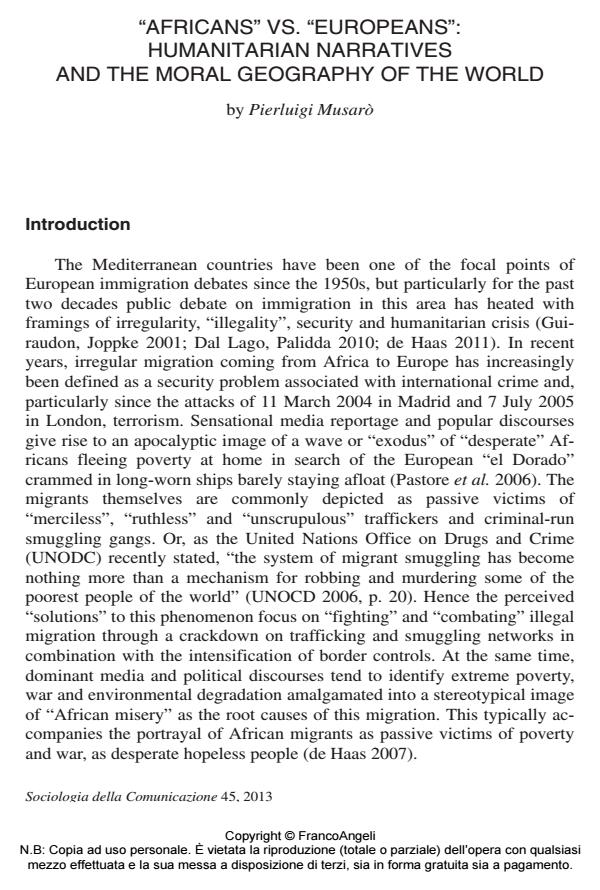"Africans" vs. "europeans": humanitarian narratives and the moral geography of the world
Journal title SOCIOLOGIA DELLA COMUNICAZIONE
Author/s Pierluigi Musarò
Publishing Year 2014 Issue 2013/45
Language Italian Pages 23 P. 37-59 File size 559 KB
DOI 10.3280/SC2013-045004
DOI is like a bar code for intellectual property: to have more infomation
click here
Below, you can see the article first page
If you want to buy this article in PDF format, you can do it, following the instructions to buy download credits

FrancoAngeli is member of Publishers International Linking Association, Inc (PILA), a not-for-profit association which run the CrossRef service enabling links to and from online scholarly content.
Moving from the assumption that borders are not mirror-like reflections of the divisions existing in the physical-cultural landscape but are fabrications people and institutions make to legitimate distinctions between them, the paper begins by identifying discourses and the ways in which humanitarian narratives usually represent Europe and Africa as "imagined meta-communities" and construct borders at imaginary levels. The article focuses on humanitarian organizations’ fundraising and awareness campaigns, the public communication of the European border control agency Frontex, and other public communications, which construct imaginaries of "Africans" and "Europeans" in different contexts through text and visual images. Finally, the paper explores how humanitarian discourse reduces vulnerable and suffering populations to voiceless victims by reifying their condition of victimhood while ignoring their history and muting their words.
Muovendo dal presupposto che i confini non sono riflessi speculari delle divisioni esistenti nel paesaggio fisico-culturale ma sono convenzioni che persone e istituzioni operano per legittimare le distinzioni tra loro, il saggio si apre identificando i discorsi e le diverse modalità in cui le narrazioni umanitarie abitualmente rappresentano l’Europa e l’Africa come "meta-comunità immaginate", costruendo confini a livello immaginario. Il saggio si focalizza sulle campagne di raccolta fondi e di sensibilizzazione delle organizzazioni umanitarie, sulla comunicazione pubblica dell’agenzia per il controllo dei confini europei Frontex, e su altre comunicazioni pubbliche che attraverso testi e immagini visuali costruiscono gli immaginari relativi ad "Africani" ed "Europei" in differenti contesti. Da qui, l’articolo esplora come il discorso umanitario riduce le popolazioni vulnerabili e sofferenti a vittime senza voce, reificando la loro condizione dell’essere vittime, ignorando al contempo la loro storia e silenziando le loro parole.
Keywords: Humanitarian narratives, border control, inequality, compassion, migration, NGO.
- Visual Securitization Alice Massari, pp.135 (ISBN:978-3-030-71142-9)
- Visual Securitization Alice Massari, pp.1 (ISBN:978-3-030-71142-9)
- Contronarrazioni del cambiamento climatico. Diari di ingiustizia climatica tra Dakar e Saint Louis, Senegal Elena Giacomelli, Sarah Walker, in SOCIOLOGIA DELLA COMUNICAZIONE 64/2023 pp.121
DOI: 10.3280/SC2022-064007
Pierluigi Musarò, "Africans" vs. "europeans": humanitarian narratives and the moral geography of the world in "SOCIOLOGIA DELLA COMUNICAZIONE " 45/2013, pp 37-59, DOI: 10.3280/SC2013-045004